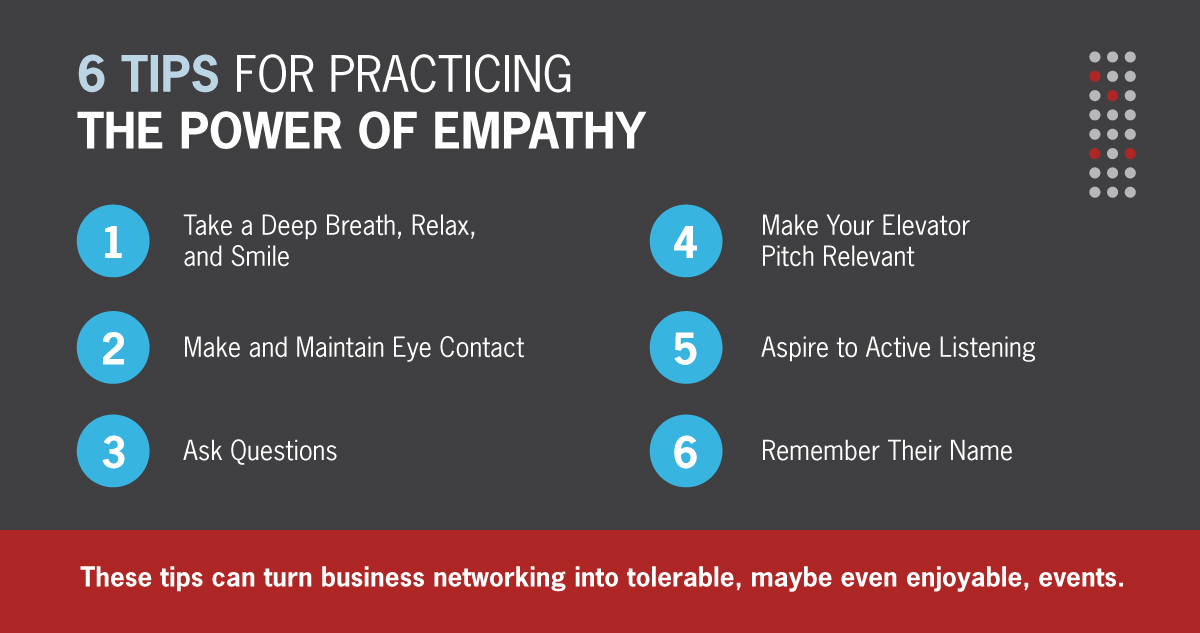
Excellent technical abilities, much like a strong grasp of modern marketing strategies, can take you a long way in your career. However, little can impede your upward career trajectory faster than a lack of people skills. Being able to effectively
communicate with others is paramount to navigating the business world.
Understanding and practicing empathy—both in personal and in business relationships—can significantly improve your existence. In fact, I can safely say that
empathy has played a central role in helping me build a successful career and a rich life.
What exactly is empathy? It’s the capacity to understand or feel what another person is experiencing from within their frame of reference,
i.e., the ability to place oneself in another's shoes.
When it comes to business networking, empathy will help you significantly elevate your game. I don’t know about you, but over the years I’ve had a love-hate relationship
with business networking. Forcing conversations in a large room full of complete strangers isn’t exactly what I would call “fun.” But it doesn’t have to be a source of anxiety.
These 6 tips for practicing the
power of empathy can turn business networking into a tolerable —maybe even enjoyable—event.
1. Take a Deep Breath, Relax, and Smile
There is nothing more disarming than a smile. When you smile at someone, you’re saying, “It is safe to speak with me,” “I am your friend,” and perhaps, “We’re in this together.” Smiling in the context of networking says, “I understand you are as uncomfortable as I am right now, but let’s talk for a minute and have some fun with this.” And remember, smiling just feels better—to you and to everyone around you. So relax and lead with a smile, and you’ll be off to an excellent start.
2. Make and Maintain Eye Contact
The eyes may be the window to the soul, but I would argue further that the eyes are an indicator of a present and empathetic soul. These days, when people are often disengaged, staring at their phones, you send a powerful message by looking someone squarely in the eye. You are saying, “I am paying attention,” “I am here,” and most importantly, “I am listening to you.” This simple skill will not only make you feel more confident and appear more empathetic, but it will make the person you are speaking with feel important.
3. Ask Questions
Don’t be a “Me Monster.” In almost any social setting, the quickest way to turn people off is to talk excessively about yourself. “I do…I think…my company…” This is the antithesis of empathy. Instead, ask numerous questions—about their company, their role, and their customers. Non-business questions are fine as well, such as asking about their interests or their hometown. There is no better way to endear yourself to someone than to simply give them the floor to talk about themselves for a minute. As you listen, look for common ground. Does your company work with similar clients? Do you deal with similar challenges and responsibilities? Are you familiar with the area where they live or work? Keep the focus on them and look for commonalities within your dialogue.
4. Make Your Elevator Pitch Relevant
You are at a networking event to make business contacts and promote your skills and/or company. So you’ll want to practice your 30-second elevator pitch so it rolls off your tongue effortlessly, succinctly hitting the most compelling highlights of your value proposition. And make it relevant. Do you work with any clients in a similar vertical to the individual you are speaking with? Do you work directly with people who have similar roles? Does your company or your work dovetail in any way with their business? If so, noting those commonalities and tailoring your pitch accordingly will show you are astute, thoughtful, attentive, and interested in them (even while talking about yourself).
5. Aspire to Active Listening
Empathetic communication requires an element of active listening, which involves listening with all senses and giving full attention to the speaker. It includes strong eye contact, smiling, mirroring, and attentive posture and body language. It requires full concentration on what is being said, avoiding distractions. You don’t have to be a master at active listening; simply understanding what it is and aspiring to it will make you a memorable communicator. Like an excellent elevator pitch, being a great listener—an active listener—takes practice, but the rewards can be immense.
6. Remember Their Name
It sounds so simple and obvious, but remembering someone’s name is a big deal. How many times have you heard, or said, “I am terrible with names”? The fact is, forgetting someone’s name is a sign of self-importance and mental laziness.
One easy trick is to call someone by their name several times during the conversation. Another is to quickly associate their face with someone else you know with the same name. If you want to make someone feel important, make the effort, concentrate,
and remember their name.
These 6 tips may help make business networking less stressful, more fun and productive, and might even propel your career. Give them a try! And if you have some other tips on empathy in business networking,
we’d love to hear from you—please share with us at info@trellist.com.
Learn more of how Trellist approaches new and evolving business problems
by checking out the rest of our blogs here.












